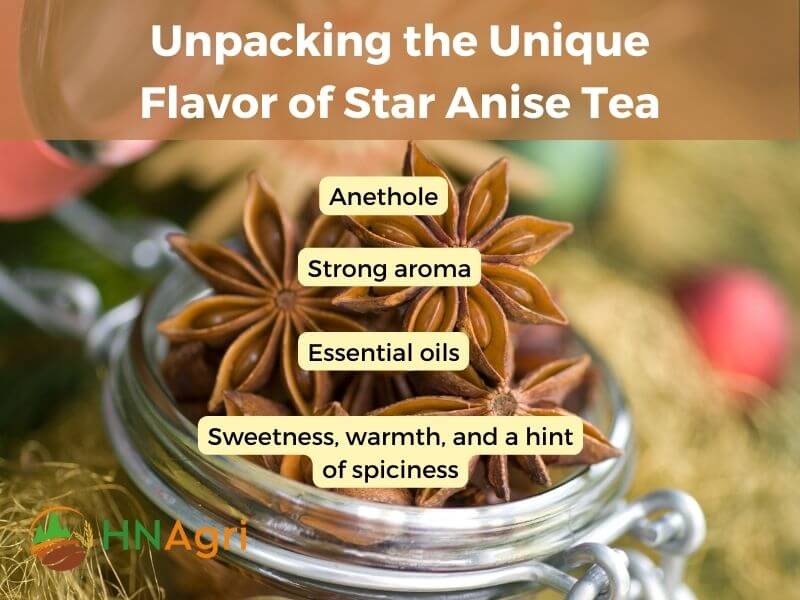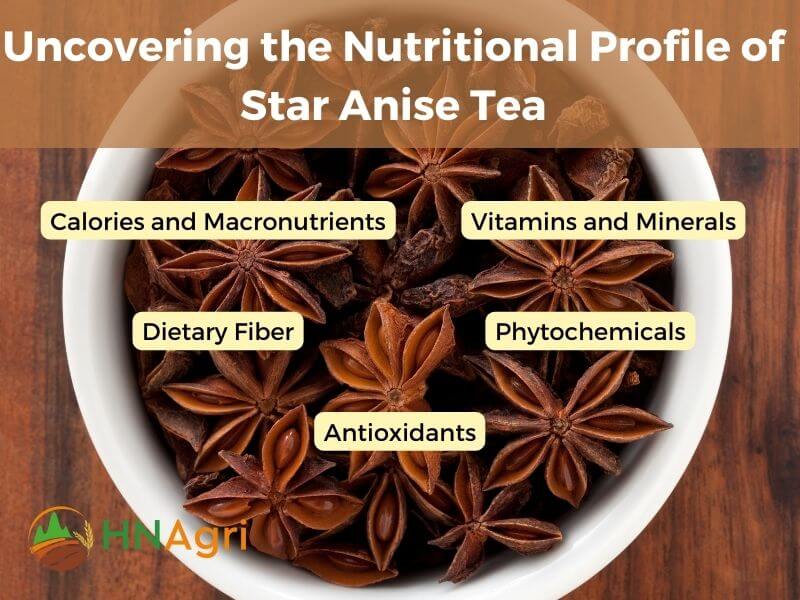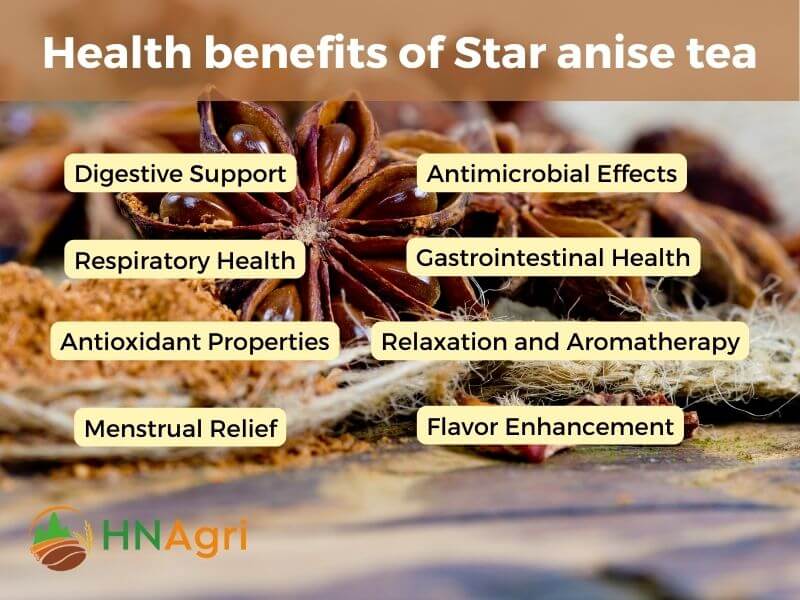Embark on a journey of wellness as we delve into the remarkable world of star anise tea. Beyond its enticing aroma and captivating flavor, this herbal infusion has been revered for centuries for its profound impact on overall wellbeing. Join us in uncovering the therapeutic secrets and embracing the rejuvenating effects of star anise tea.
Table of contents
- 1. The Healthful History and Origin of Star Anise Tea
- 2. Unpacking the Unique Flavor of Star Anise Tea
- 3. Introduction to the Benefits of Star Anise Tea for Health and Wellbeing
- 4. Creative Ways to Incorporate Star Anise Tea into Your Daily Diet
- 5. Potential Side-Effects and Precautions to Consider when Drinking Star Anise Tea
The Healthful History and Origin of Star Anise Tea
Star anise tea is a popular herbal beverage with a rich history and origins tied to various cultures and traditional medicine practices. Here’s an overview of its healthful history and origin:
Star anise (Illicium verum) is a spice derived from the dried fruit of the star anise tree, native to China and Vietnam. The anise has been used for centuries in various cultures for culinary, medicinal, and therapeutic purposes. The distinctive flavor and aroma of star anise have made it a staple ingredient in many Asian cuisines, particularly in Chinese, Vietnamese, and Indian dishes.
In conventional medical practices like Traditional Chinese Medicine (TCM) and Ayurveda, star anise has a long history of use. It was considered to have a number of health advantages and was applied to treat conditions like digestive disorders, lung troubles, and menstrual discomfort. According to TCM, star anise was believed to have a warming effect on the body and was frequently used to encourage digestion, soothe stomach pain, and lessen the symptoms of a cold.
Star anise is widely used as a flavoring agent in both sweet and savory dishes. It imparts a distinct licorice-like flavor and is often used in broths, soups, stews, sauces, and baked goods. In addition to its culinary applications, star anise has been incorporated into beverages like tea for its aromatic and potentially healthful properties.

Unpacking the Unique Flavor of Star Anise Tea
The unique flavor of star anise tea is a result of the compounds found within the star-shaped pods of the star anise fruit. These compounds contribute to the tea’s distinct aroma and taste, which are often described as sweet, licorice-like, and aromatic. Let’s unpack the elements that create the distinctive flavor of star anise tea:
- Anethole is a primary compound responsible for the characteristic flavor and aroma of star anise in tea. It is a volatile aromatic compound that imparts a sweet and licorice-like taste. Anethole is also found in other plants, such as anise seeds and fennel, which share similar flavor profiles.
- Star anise contains essential oils, which are concentrated extracts responsible for its strong aroma. These oils contain various aromatic compounds, including anethole, estragole, and eugenol, among others. When steeped in hot water, these essential oils are released, contributing to the aromatic and flavorful qualities of the tea.
- The unique flavor of star anise tea is a result of the interaction and synergy between different compounds present in the star anise pods. These compounds work together to create a complex and layered taste experience that combines sweetness, warmth, and a hint of spiciness.
- The flavor of anise tea can also be influenced by the quality of the star anise used, the brewing time, and any additional ingredients that are added to the tea. For example, some variations of anise tea may include other herbs, spices, or sweeteners, which can interact with the star anise flavor and create a more nuanced taste profile.

Introduction to the Benefits of Star Anise Tea for Health and Wellbeing
So now let’s uncover the health benefits and nutritional profile of star anise tea for users.
Uncovering the Nutritional Profile of Star Anise Tea
Star anise tea, like many herbal teas, is not typically consumed for its nutritional content, but rather for its potential health-promoting properties and aromatic flavor. However, star anise does contain certain compounds that contribute to its overall profile. Here’s an overview of the potential nutritional components and compounds found in star anise in tea:
- Calories and Macronutrients: Star anise tea is a low-calorie beverage. The primary macronutrient found in the tea is carbohydrates, primarily in the form of dietary fiber. However, the amount of carbohydrates in a cup of anise tea is typically minimal.
- Dietary Fiber: Star anise contains dietary fiber, which is known to support digestive health and regularity. When the dried star anise pods are used to make tea, a small amount of dietary fiber may be present in the brewed beverage.
- Vitamins and Minerals: While star anise does contain trace amounts of vitamins and minerals, these nutrients are not typically present in significant quantities in star anise tea. However, the brewing process may release some water-soluble vitamins and minerals into the tea.
- Phytochemicals: The compounds found in star anise, including anethole, eugenol, and other aromatic compounds, are considered phytochemicals. These compounds contribute to the flavor, aroma, and potential health benefits of the tea. Some of these phytochemicals have antioxidant, anti-inflammatory, and antimicrobial properties.
- Antioxidants: Antioxidants are compounds that help protect the body’s cells from oxidative damage caused by free radicals. Star anise benefits for skin are indisputable. While star anise contains certain antioxidants, the specific antioxidant content of anise tea may vary depending on factors such as preparation and brewing time.

Health benefits of Star anise tea
Star anise tea has been traditionally consumed for its potential health benefits, many of which are attributed to the compounds found in star anise, such as anethole and other phytochemicals. While scientific research is ongoing and more studies are needed to fully understand the extent of these benefit, here’s a concise list of potential health benefits with star anise in tea:
- Digestive Support: Star anise tea may help ease bloating, gas, and indigestion due to its carminative properties.
- Respiratory Health: The tea’s aromatic compounds might soothe coughs and congestion, aiding respiratory comfort.
- Antioxidant Properties: Star anise contains antioxidants that combat harmful free radicals in the body.
- Menstrual Relief: It could help alleviate menstrual discomfort and cramps.
- Antimicrobial Effects: Star anise’s essential oils may have mild antimicrobial properties, supporting oral health and immunity.
- Gastrointestinal Health: The tea might help ease nausea and stomach discomfort.
- Relaxation and Aromatherapy: Drinking star anise tea can be a calming ritual, reducing stress.
- Flavor Enhancement: Beyond health benefits, the tea’s unique flavor can enhance culinary experiences.
Remember, individual responses vary, and consulting a healthcare professional before adding anise tea to your routine is advisable, especially if you have health conditions or are on medication.

Creative Ways to Incorporate Star Anise Tea into Your Daily Diet
Incorporating star anise tea into your daily diet can add a unique and flavorful twist to your culinary routine. Here are some creative and enjoyable ways to use it:
- Hot Beverage: The simplest way to enjoy tea with star anise is as a hot beverage. Brew the tea by steeping dried star anise pods in hot water for a few minutes. You can enjoy it on its own or add a touch of honey or lemon for extra flavor.
- Iced Tea: For a refreshing twist, brew anise tea and chill it in the refrigerator. Serve it over ice and garnish with fresh mint leaves or a slice of orange for a cooling and flavorful iced tea.
- Infused Water: Enhance your hydration routine by adding star anise tea to your water. Brew a batch of tea, let it cool, and mix it with plain water for a subtly aromatic infused water.
- Culinary Uses: Use tea with star anise as a flavorful ingredient in your cooking. Consider using it as a marinade for meats, poultry, or tofu. You can also add a splash of cooled anise tea to your stir-fries, soups, or sauces for an extra layer of taste.
- Oatmeal or Porridge: Infuse your morning oatmeal or porridge with anise tea instead of regular water or milk. This can add a delightful hint of sweetness and spice to your breakfast.
- Baking: Incorporate anise tea into your baking adventures. Add brewed and cooled tea to your cake batters, muffin mixes, or cookie dough for a unique and aromatic flavor.
- Smoothies: Blend anise tea with your favorite fruits and vegetables to create a flavorful and aromatic smoothie. This can be a great way to enjoy the benefits of star anise while getting your daily dose of nutrients.
- Cocktails and Mocktails: Create signature cocktails or mocktails by using anise tea as a base. Mix it with fruit juices, herbs, and a splash of sparkling water for a refreshing and intriguing beverage.
- Rice or Grain Cooking: Use star anise tea as the cooking liquid for rice, quinoa, or other grains. This adds a subtle, fragrant flavor that pairs well with a variety of dishes.

Potential Side-Effects and Precautions to Consider when Drinking Star Anise Tea
While star anise tea is generally considered safe for consumption in moderation, there are some potential side-effects and precautions to be aware of:
- Allergic Reactions: Some individuals may be allergic to star anise or other plants in the same family, such as aniseed or fennel. If you have a known allergy to these plants, it’s best to avoid anise tea to prevent allergic reactions.
- Pregnancy and Lactation: People who are pregnant should use caution when drinking tea with star anise because excessive amounts could be dangerous. Star anise has been linked to uterine stimulation and may increase the risk of pregnancy issues. Before include anise tea in your diet while expecting or nursing, it is best to speak with a healthcare provider.
- Children: Star anise tea is not recommended for young children, especially infants. The aromatic compounds in star anise can be overwhelming and may cause adverse reactions in young, sensitive individuals.
- Moderate Consumption: As with any herbal remedy, moderation is key. Excessive consumption of anise tea, especially over prolonged periods, may lead to potential adverse effects. Enjoy it as part of a balanced diet and consult a healthcare professional if you have concerns.






